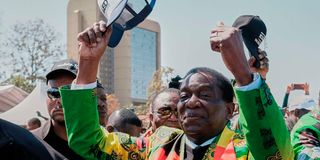ZANU-PF eyes more seats with main opposition locked out of by-elections

Zimbabwean President and ZANU PF leader Emmerson Mnangagwa raises his cap in salute to the crowd gathered during a rally in Harare on August 9, 2023.
What you need to know:
- Barring a Supreme Court reversal, the ruling ZANU-PF will now pick up some easy seats as it moves closer to changing the constitution.
- But authorities said that one of the by-elections would not even be held as there was only a ruling party candidate.
Zimbabwe will hold a series of by-elections on Saturday without any main opposition candidates as President Emmerson Mnangagwa cements control over the mineral-rich nation.
A political crisis has been growing since a group of opposition Citizens Coalition for Change (CCC) MPs had their seats declared vacant.
Courts ruled on Thursday and Friday that all of the CCC contenders would be barred from standing in the new votes.
Barring a Supreme Court reversal, the ruling ZANU-PF will now pick up some easy seats as it moves closer to changing the constitution.
But authorities said that one of the by-elections would not even be held as there was only a ruling party candidate.
"The overall effect of this in terms of undermining any hope for Zimbabwe of democracy right now, is very clear," said Nic Cheeseman, a professor of African politics at the University of Birmingham in Britain.
The crisis was sparked by a letter sent in October by Songezo Tshabangu, a little-known politician claiming to be the CCC's interim secretary-general.
Addressed to the ZANU-PF parliamentary speaker, it stated that 15 CCC lawmakers elected in a bitterly contested legislative election in August had ceased to be party members and should lose their seats.
Struck off the ballot
CCC leader Nelson Chamisa, 45, protested that Tshabangu was not a CCC member, the party had no secretary-general and had not expelled any MP.
The speaker ignored him and declared the seats vacant.
This resulted in by-elections for nine seats that were adjudicated under a first-past-the-post system. The rest were awarded using a proportional representation system. ZANU-PF has denied causing the turmoil.
"We have an irresponsible opposition that is selfish and is self-imploding," party spokesman Farai Marapira told AFP.
The CCC said it expected its candidates to remain on the ballot pending a court appeal.
But in Mabvuku, a Harare suburb where a vote was supposed to be held on Saturday, electoral authorities said no by-election would take place.
The electoral commission declared the ZANU-PF candidate the winner uncontested after his CCC opponent was struck off the ballot.
ZANU-PF is 10 seats short of the two-thirds majority in the 280-member parliament needed to amend the constitution. The CCC won 104 seats in August.
Analysts believe ZANU-PF wants to scrap a two-term presidential limit. This would allow Mnangagwa, 81, to counter any challenge to his leadership.
Toppled Mugabe
The term limit was introduced in 2013 after long-time ruler Robert Mugabe was forced to accept a power-sharing government with the opposition.
Critics say Mnangagwa, who came to power on the back of a 2017 coup that toppled Mugabe, is even more autocratic than his predecessor.
Hopes that he could lead Zimbabwe on a more democratic path, foster foreign investment and turn around the dire economy have fallen by the wayside, said Christopher Vandome, of the Chatham House think tank in Britain.
Parliament has passed laws to silence dissent. The courts have been stripped of their independence, rights groups say.
International observers said the August election fell short of democratic standards.
The CCC has complained about intimidation against its members before and after the vote.
Meanwhile, Tshabangu, who denies being a ZANU-PF stooge, has penned more letters, seeking control of party funds and recalling another 13 lawmakers -- something the CCC is battling in the courts with little success.
"Their infighting is our harvest," Patrick Chinamasa, ZANU-PF treasurer told a mass rally in Mabvuku on Thursday.





